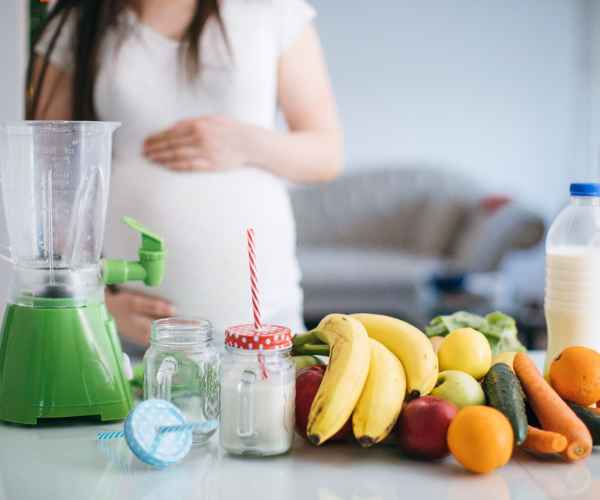During the gestation period, water consumption is foundational and crucial for the mother and the child being carried.
Ample water intake happens to be necessary for the proper growth of the child, the optimal functioning of the mother’s body, as well as the mother’s mood and energy level.
For the growing fetus, hydration aids in the formation of amniotic fluid, helps in the transport of nutrients, and assists in heat absorption.
Research indicates that optimal hydration complements appropriate amounts of amniotic fluid which are important for suitable development of the baby.
A cross-sectional study published in The Journal of Perinatal Medicine in 2019 found out that women who drank more water during pregnancy, and maintained an appropriate level of hydration, had less chances of preterm birth, as well as other complications such as a low level of amniotic fluid.
Furthermore, drinking plenty of fluids makes it possible for there to be an adequate blood volume, which is necessary as it increases in proportion to the weight of the baby being carried. This guarantees that both the newborn and the mother have sufficient amounts of oxygen and nutrients.
To put it differently, water is like the crucial connector that enables the transfer of essential nutrients to the baby via the functions of a mother’s body.

The Cost of Ignorance While Carrying A Child:
When a pregnant woman does not drink enough fluids, dehydration can occur and negative consequences will result.
In the early months of pregnancy, clinical studies show that dehydration causes morning sickness to intensify, thereby leading to more instances of vomiting and dizziness as a result.
Amniotic fluid protects the baby and allows the baby to grow. However, during the final months of pregnancy, If a woman is suffering from dehydration, her levels of amniotic fluids may decline, thereby hindering the development of the unborn child and predisposing the mother to preterm labor.
Furthermore pregnant women are at a much higher risk of developing urinary tract infections (UTIs) and kidney stones which in turn can result in the dehydration itself
Dehydration during mid and late term pregnancy has been associated with preeclampsia, which affects both mother and child and can lead to compromised cardiovascular health.
In the worst-case scenario, sever amounts of dehydration can even lead to pregnancy contractions which can further risk pregnancy altogether rather be done successfully.
It’s safe to say the any worrying triggers ought to be addressed earlier on as targeting hydration parameters would best be the way!
How Hydration Changes During Each Trimester:
Taking a fluid intake haven’t proven to be significantly effective for some maternal women due to expectations of the mother having been completely altered each trimester.
First Trimester:
If the mother is suffering from menstrual nausea, they are recommended to drink ample water so as to properly balance their fluids and hydrating levels while amending to pregnancy transitions.
Throughout the day, remember that you need to keep drinking water reasonably. In addition, include coconut water or other electrolyte solutions to replace the fluid loss from vomits.
Second Trimester:
By this time, the blood volume of your body rises by 50%.
This is the time when the requirements of your body for hydration becomes quite evident.
With the increased blood flow and a baby who is growing inside you, you need more water.
Neglecting the hydration goals at this stage can result in dehydration problems, abdominal pain, and swelling – all of which need to be appropriately managed.
Several women report having a desire to eat water dense fruits like watermelon, which are lovely fruits during this stage to help you meet the hydration goals.
Third Trimester:
During the third trimester, the amount of pressure amplified on your bladder increases which triggers quite discomfort to consume high volumes of water at once.
Still, your body along with the unborn baby inside requires and demands higher levels of fluid intake.
Allowing dehydration at this point can cause preterm labor or other risk factors, hence it is advisable to take baby steps and sip a small amount of water through the day.
Another trick could be placing a bottle of water next to you and drinking it at regular intervals when need.
Myths and Facts About Hydration During Pregnancy:
Let’s take for example Myth 1. “You don’t need extra water in the first trimester.” It is completely false for expecting mothers to believe that there are no difficulties when it comes to drinking water in the first trimester because of the body changes let alone the fact that it is important to drink fluids even in the first stage of pregnancy.
You are likely to suffer from complications such as fatigue, dizziness as a result of lack of water intake or dehydration and therefore it is so important to keep drinking enough amounts of water.
Myth 2: Drinking too much water will cause swelling. The truth is, water consumption does not make you swollen, however being pregnant and having hormonal changes may contribute to it.
On the contrary, water consumption will do wonders for you because it will support in losing out on too much sodium hence leading to water retention and causing swelling.
Myth 3: Water has the same benefits as sugary beverages. Water is one and most important essential source that nourishes the body along with minerals, vitamins and electrolyte all of which are found lacking in sugar water.
You can also look at herbal teas and fresh juices without added sugar, that along with water can help you in getting hydrated.
Improved emotional and mental stability for future mothers:
You can say water is magical as it not only helps the body but is beneficial for one’s mental and emotional state of being as well. More importantly water can do wonders during pregnancy by regulating mood swings, minimizing anxiety levels and improving the overall quality of sleep.
It is advised to always remain adequately hydrated in order to help prevent risks associated with fatigue, mood swings and irritability.
Moreover, there exists evidence where women reported symptoms of clinical panic and depression less frequently if they drank more water during the time of their pregnancy.
It is primarily due to the fact, water is needed in the synthesis of serotonin, which is a neurotransmitter known greatly commonly for the regulation of mood.
Sum up all small inconveniences like taking a sip of water. This also might relate to doing smaller things more often that will help put you in a state of relaxation.
Use the time you are consuming water to also relax. For instance, try combining the act of drinking water with breathing techniques or engaging in simple meditation.
Water as well as pregnancy is viewed through the same lens, feeling calm as well as taking good care of one’s body is extermely important during those days.
Drinking water while pregnant can help prevent going through uncomfortable phases of life, it also helps feel more balanced and filled during tough times in one’s life.
Because pregnancy is almost always associated with new beginnings as well as water is also a well-renowned element symbolising new life, This does make a lot of sense.
In many cultures, water helps grow things, Many people worships it as it has durable qualities.
Also, do remember to take it easy while drinking water so that your body as well as your baby feels nourished in a way.
It’s hard to imagine, but the action of taking water is undoubtedly a reason anyone such as myself can consider the perfectionist art of creating life, a wonder that I urge everyone to indulge in.
Hydration Tips for Pregnant Women: A Starting Point for The Vital Hydration During Pregnancy
During a pregnancy, one needs to be sure about their hydration. Being pregnant is much more than just satisfying thirst, it is about nurturing all the organs in the body to make sure that both the woman, and the fetus are healthy and working perfectly. Pregnancy is one of the times when a woman’s body evolves the most and staying hydrated fosters these changes starting from nourishing the organs to maintaining the body’s heat.
The risks of preterm birth, low amniotic fluid, and developing urinary tract infections are all associated with low fluid intake. Ensuring that your body is sufficiently hydrated allows the aforementioned dangers to be avoided, and most importantly, protects the newly formed life. One should never forget to drink ample amounts of fluid to assist in maintaining circulation, digestion, and other operations of the body.
The significance of hydration is there for one to see, and so are the multiple methods to help remain sufficiently hydrated, but a deeper understanding of these aspects is essential to be able to fully grasp the significance they bring.
Speciality: Hydration as an Integral Part of Antenatal Care
The importance of hydration is undeniable during an antenatal period. It is not merely taking liquids but ensuring that the body is supplied with adequate fluids and electrolytes at all stages of pregnancy. Proper hydration improves the regulation of the increased volume of blood circulation, the amount of amniotic fluid, and the transfer of nutrients to the baby.
During the period of pregnancy, every woman’s body goes through significant physiological and biological changes which increases the requirement of water in her body, including expansion of blood supply due to growth of placenta and fetal development. Failure to take in adequate amounts of water would make it impossible for the body to satisfy some of these needs, thus giving rise to various complications.
Symptoms for Pregnancy Dehydration
Knowing the warning signs is very important as it can help avoid complications in anticipating dehydration. Both you and your child can be at risk because of dehydration during pregnancy, therefore it is crucial to be in tune with your body. These are some of the most common symptoms of dehydration in pregnancy you should pay attention to.
- Dry mouth and throat: This is among the first signs your body signal which can be a result of inadequate water intake.
- Fatigue and dizziness: This occurs when there is interference to blood flow and delivery of nutrients to important organs because of dehydration.
- Headaches: Tension throughout the body caused by insufficient hydration could potentially lead to headaches.
- Decreased Urine Output: A decreased frequency in urination might be indicative of the body conserving water in order to prevent a loss of it for further retention.
- Dark Yellow Urine Color: If water intake is inadequate, the color of urine would be darker than the normal shade.
If any of these symptoms are consistent within you, rectifying the cause of dehydration should be a priority, to prevent further complications from arising.
Complications of Dehydration During Pregnancy
Pregnancy complications can arise due to dehydration, several of which are mentioned below:
- Preterm Labor: Contradicting the common perception that labor can only commence post the completion of the nine month period, there is an increased risk of contractions which forcibly result in labor opening, that occur as a result of dehydration. However, this can be prevented by drinking enough water which would help sustain the internal environment as the baby develops hence marking the end of the need to go into labor.
- Urinary Tract Infections: Kidneys could be affected as a result of Pain and discomfort triggered by UTIs, which are caused by dehydration.
- Low Amniotic Fluid Levels: Dehydration may contribute to the birth of a fetus which has stunted growth and slowed movement as a result of a lack of Amniotic fluid which is crucial for cushioning the infant.
Constipation The problem of constipation is very prevalent among pregnant women due to hormonal changes which often leads to dehydration. Consuming an adequate amount of water helps in locomotion of food in the digestive tract.
This goes without saying that every woman needs to remain hydrated throughout the course of her pregnancy so as to mitigate any risks for herself as well as the unborn foetus.
Duration, When Hydration is the Key
Hydration is one of the most essential aspects for a woman when she is pregnant. However, the importance of hydration becomes pronounced during the second and third trimesters.
- First Trimester: Hydration is still needed, but think how much more important it could be if you suffer from morning sickness. Make sure that you fill yourself sufficiently with fluids as this could help you curb the feeling of throwing up and dizziness.
- Second and Third Trimesters: The average study has confirmed that the need for hydration during these stages is far more pronounced or pronounced by a significant degree. As blood volume increases by up to fifty percent, the body is also going to require more water for circulation and transport of nutrients.
In this period, due to increased production of amniotic fluid, there is a need to stay hydrated so as to avoid any untoward consequences. Also, the increase in the rate at which the plans grow and the increased secretion of sweat will mean that more water is required.
To add, while it is important that pregnant women stay hydrated during all three trimesters, hydration intake should be increased in the third trimester due to increased physiological need of the woman’s body.
Factors that help in Dehydration in Pregnancy
Pregnancy brings about physical and physiological changes which require the mother to stay hydrated as a lot of things can lead dehydration. Here is an explanation of such factors.
- Increased amount of blood circulating in pregnancy: Pregnancy leads an increase in the blood volume of the woman so as to supply the baby with adequate nutrients. However, this results in the work of kidneys to increase in volume too which leads to urine production. The situation leads to the loss of fluids which requires the intake of more water.
- Pregnancy hormones: One of the most common pregnancy hormones is progesterone. While this hormone is essential during the pregnancy, it can also hinder the body from retaining liquid. This eventually leads to dehydration.
Vomiting: Morning sickness is also a common symptom during pregnancies in women. It exposes the person to nausea and vomiting. Losing fluids through vomiting can lead to an electrolyte imbalance.
Heat and excessive physical activity: Sweating can lead to a loss of fluids which can ultimately lead to dehydration. It is therefore necessary to drink water before and after a workout or any heated activity.
Keeping these factors in mind should therefore be critical in helping you understand what additional to include in your system to avoid dehydration.
Pregnancy puts a lot of demands on the body, and staying hydrated is essential. If you’re worried about dehydration, make sure to heed the following advice.
1. Spread out your water intake throughout the day: Instead of chugging water in large amounts, you’ll find it more effective to take small sips and consume water during the day if possible. Every day, you should aim to drink 8-10 cups of water.
2. Fuse hydrating foods into your diet: Fruits and vegetables such as cucumbers, oranges, and watermelons have a high water content and will aid in hydration. Additionally, these foods help provide necessary vitamins and minerals.
3. It’s best to avoid caffeinated or sugary drinks: Sugary and caffeinated drinks can cause your body to lose water – have herbal teas, natural juices, or water instead.
4. Always carry a water bottle with you: If you notice you regularly forget to hydrate, bring a water bottle to serve as a reminder to drink on the go.
In essence, if you take the above measures, you will not run the risk of dehydration regardless of the physical strains pregnancy places on you.
Drugs and Therapy for Chronic Dehydration
If the condition worsens to the extent of becoming chronic, then the first step is medical attention. This may include the following therapies:
- Oral Rehydration Salts (ORS): These are manufactured fluids that can be used to prevent further dehydration and/ or replenish lost fluids and electrolytes. This would be the case if severe Dehydration has already occurred as a result of diarrhea or vomiting and fluids need to be reinfused.
- Prescription drugs: There are times when dehydration could trigger complications like preterm contractions or urinary tract infections. Many times, medications are used to treat these condition or complications that may arise after dehydration. This includes antibiotic or contraction controlling drugs to ensure both mother and the baby are safe and healthy.
Table of Concern: Hydration Solutions During Pregnancy
| Concern | Solution |
|---|---|
| Dehydration Symptoms | Increase water intake and hydrating foods |
| Low Amniotic Fluid | Regular hydration monitoring |
| Fatigue & Dizziness | Consistent hydration throughout the day |
By staying aware of the symptoms and concerns associated with dehydration during pregnancy, you can take proactive steps to maintain optimal hydration and promote the health of both you and your baby.
Myths vs. Facts About Hydration During Pregnancy
Hydration is frequently regarded as one of the more important components during pregnancy but there are still many beliefs that are incorrect. It is crucial to debunk such beliefs so that one can rest easy knowing they are doing what is right for their bodies and their babies. In essence, let’s review some of the false beliefs surrounding hydration during pregnancy and provide the truth based on facts.
Myth 1: Extra Water is Only Required in the Third Trimester
Fact: Extra hydration is required for all three trimesters of the pregnancy, and the first one is when it is most critical to be active.
Many citizens think that there is no necessity of increasing water intake until in the late stage of pregnancy, especially because during the latter part of the pregnancy body tends to carry a lot of weight and the baby is in rapid growth stage. Nonetheless, hydration is something that should be emphasized from day one in your pregnancy even in the first attempt at conception. The 1st trimester is characterized by a shift in the balance of hormones, morning sickness and periods of exhaustion that lead to the risk of dehydration for both oneself and that of the growing foetus.
For instance, one of the studies revealed that proper water intake within the first trimester will assist women in alleviating the effects of morning sickness as well as encouraging fetal development in the early stages. When the body is dehydrated, fatigue, low energy and headaches are examples of problems which can become a factor that aggravates the discomfort normally associated with early pregnancy.
In the second and third trimesters, hydration levels have to be boosted due to the expansions in blood volume and the increase in amniotic fluid volume. Hydration facilitates nutrient transportation, thermal stress alleviation and proper blood flow. Therefore, it is important to ensure that no matter the pregnancy stage, the body takes sufficient water in daily.
Myth 2: Drinking More Water Will Cause Swelling
Fact: Swelling is a result of increased blood volume and hormones during pregnancy and cannot stem from the water intake. It is actually the opposite, and so properly hydrating will bring down the swelling in all instances.
Not surprisingly, the swelling of legs, feet and ankles is the most common cause of discomfort in pregnancy. However, there is a belief that excessive watering can lead to worsening of the body swelling, which is not the case. Pregnancy hormones such as progesterone as well as high blood volumes in the body in pregnancy are the actual cause of this swelling.
Hydration is very beneficial in helping reduce the amount of swelling in various injuries.When you are adequately hydrated, your body has the capacity to control the amount of fluids in it and eliminate the excessive sodium that causes water retention. In the other case, if there is not enough amount of water, the body resorts to fluid retention in order to prevent dehydration, and more of the body will become swollen.
What the National Institutes of Health Study Finds about Swelling during Pregnancy
In a study published by National Institute of Health (NIH) drinking enough water while pregnant helps in kidney function, reduces the burden on the circulatory system and aids in sodium balance. In case you notice that the tissues in your body are ‘swollen’, do not worry; keep drinking water so that your body gets rid of some water that does not need to be retained.
Hydration Tips for Mental and Emotional Well-being during Pregnancy
It is common to concentrate on the physical requirements of pregnancy, but do not disregard the psychological as well as emotional sides of pregnancy. Maintaining a regular level of hydration can also have a positive impact towards the brain, allowing it to lessen anxieties, elevate the mood and increase energy. Let’s discuss how hydration impacts psychological health during the pregnancy stage.
How Hydration Affects Mental Resilience
There is a well-balanced hydration of the body which reflects on the mental clarity level, the amount of anxiety experienced and even the joy found during mood changes, so all of these factors matter during the pregnancy phase and are key in maintaining emotional health.
While expecting, strong feelings and anxiety can arise due to several factors involving one’s body as well as the child’s impending arrival. Such problems as tiredness, irritability, and mood fluctuation can be worsoned by downing drinking water. Studies have indicated that dehydration can lead to a decrease in cognitive function resulting in problems in focusing and concentration as well as an overall feeling of sluggishness.
Alternatively, improved hydration also promotes better brain function and energy along with increased production of hormones such as serotonin, which has a positive impact on mood. According to the Journal of Clinical Nutrition, sufficient consumption of water and other fluids belongs to the methods of enhancing the experience and the spirit in women mostly to help them combat the adverse mental effects of the pregnant phase.
As it is important to stay hydrated and keep your physical health in shape, even more so, it is important to maintain mental stability. Indeed, drinking the recommended quantity of water can help to maintain emotional equilibrium and mental positivity right during pregnancy.
The Importance of Hydration in Enhancing Spirituality during Pregnancy
Hydration has many advantages and one of them includes providing some kind of spiritual balance which can be quite essential to pregnant woman. Quite a number of people have stated that a sense of calm is achieved after taking adequate water. So quite a number of people feel more relax, balanced, and grounded when they are well hydrated.
As far as an expectant mother is concerned, hydration simply means drinking adequate water which will enable her to connect better with her pregnancy journey. Preservation of an expectant mother’s hydration allows for the regulation of her temperature, nervous system, and circulation. All of these contribute to emotional balance which is crucial during such a time of transformation.
Nonetheless, women who practiced sufficient hydration during their pregnancy were friends of Harvard Medical School where it was conducted. Women who practiced that did not feel lost or unbalanced, but rather very connected to their bodies and to the act of creation – and the act of creation is a new life.
Hydration always helps one stay calm and composed throughout the day; and these are great traits to have as a pregnant woman where mental tranquility is truly necessary. Nurturing through hydration creates a sense of security that enables a woman to feel more calm during her pregnancy journey.
It is also important for women in menopause to address these hydration myths because hydration impacts all aspects of health. It’s easy to be overwhelmed with everything going on during pregnancy. You may find it hard to fathom, but drinking enough water can increase your energy, lessen anxiety, help you handle challenging situations, and keep you in peace as well during the pregnancy. Drink more water, for it is beneficial to both the body and soul, and it will make carry out activities easy on the abdomen during the entire duration of the pregnancy.
FAQs
How much water should I hydrate myself with while pregnant?
Women who are pregnant or are expecting a child are normally advised to drink around 8 to 10 cups of water every day. This is close to 2-2.5 liters. Lot of other factors can also take place say for example activity, ambient temperature and one’s health etc. If one happens to be more active, there is a need to replace the water loss through sweat with drinking water. If there is a dry and hot climate, one will need excess which can lead to an increase in perspiration.
Your second question is the correlation of dehydration with mother and baby blood. There is an increase of around 50 percent in the overall blood volume across the pregnant women and if you do not hydrate yourself then you will have difficulty in blood circulation for both you and your fetus. While drinking water say for example, water from fruits, vegetables and herbal tea, etc can help you keep up with your hydrated state. All one needs to do is repeat the mantra listen to your body and if you suffer from thirst or injuries, drink plenty of fluids.
Are there other fluids I can take other than water?
Yes, to maintain hydration, you can also consume fluids other than water. In fact, fruits as well as vegetables possess water retaining substance making it an ideal form of food in large amounts and herbal teas amongst others can also be ingested to help treaty the dehydration.
Herbal teas like ginger or peppermint are useful options, especially if nausea or any digestive related issues have arisen during the pregnancy. However, it’s worth knowing that caffeinated drinks like coffee or regular tea may have a mild diuretic effect and cause the body to urinate more often leading to some fluid loss. Limiting caffeine intake and switching to caffeine free herbal teas that are safe for pregnant women is ideal.
Other edible items like cucumbers, watermelon, strawberries, and oranges contain over 90% of water and help maintain that balance. For example, cucumber contains around 96% water and if consumed during pregnancy, it will help with the hydration. So in fact, if water isn’t your best option, water-heavy food are a good source of hydration. Eat a variety of hydrating food in your meals as they also contain other valuable nutrients such as vitamins, minerals and fiber essential for maintenance of your health and for the baby’s development.
Is my baby at risk for dehydration?
Yes, dehydration can have a negative effect on baby’s rest of the development cycle. Dehydration in pregnancy can also result in other issues like having insufficient levels of amniotic fluid which impacts pregnancy health. Amniotic fluid serves as a cushion for the baby, thermoregulation, and assists in the development of lungs and organs. If the fluid level drops, baby’s development can be affected and in some cases may result in preterm labor.
Besides, maternal dehydration can lead to urinary tract infection (UTI), an increased risk of preterm labor, and also complications such as constipation and headache. It has been researched that pregnant women who are dehydrates are at a more risk of complications as compared to the properly hydrated ones. Hydration also maintains blood volume and blood circulation which determines the nutrient supply to the baby.
You should minimize your risk for dehydration-related issues and improve your baby’s growth potential by increasing the amount of fluid intake. During pregnancy, try to maintain a healthy intake of water and fluids containing electrolytes as much as possible. This is one of the simplest and most effective ways to protect you and the development of your baby.
What action should I take if I feel dehydrated?
Should you find yourself in a state of dehydration, the first course of action is to drink water as soon as practical. These are some straightforward measures you can use:
Rehydrate with plenty of water, but don’t rush it. Take small sips throughout the entire process instead of taking a big gulp.
To prevent additional performance stress on the body, it is advised that you take a break. Because of the lack of water in the body, you may get tired and even feel faint. This sensation is common, and lying down in a cool and comfortable spot will help you overcome it.
Foods such as watermelon, cucumber, and citrus fruits that are high in water content, should be consumed as they will assist in restoring water balance to the body. Water is contained in these foods, which can provide an additional source of hydration.
If signs of dehydration persist or get more severe, talk to your doctor. When experiencing dizziness, dry mouth, and urinary hesitance, make sure to contact a doctor immediately.
However, dehydration is avoidable with sensible fluid management strategies. For example, prevent oversaturation by monitoring your intake. One must be very careful during the hottest time or after working out.
Conclusion
One of the easiest ways to maintain a healthy pregnancy is to stay hydrated. Drinking sufficient amounts of water as well as incorporating hydrating foods and fluids assures health not just in terms of physical aspects but also in mental, emotional and spiritual spheres. Hydration aids in alleviating the risk of complications such as swelling, headache, and low levels of amniotic fluid, as well as boosting energy and even mood.
It is necessary to highlight that proper hydration does not only make you feel better, it also ensures that your baby is healthy. Because adequate hydration is essential for the health and growth of your baby, it also allows your body to adapt to all the changes associated with pregnancy. As a result, you need to ensure that you drink sufficient amounts of fluid throughout the day and observe how your body reacts to different approaches. When you keep up with your hydration needs, you are preparing yourself for a more seamless and pleasant experience of pregnancy.






